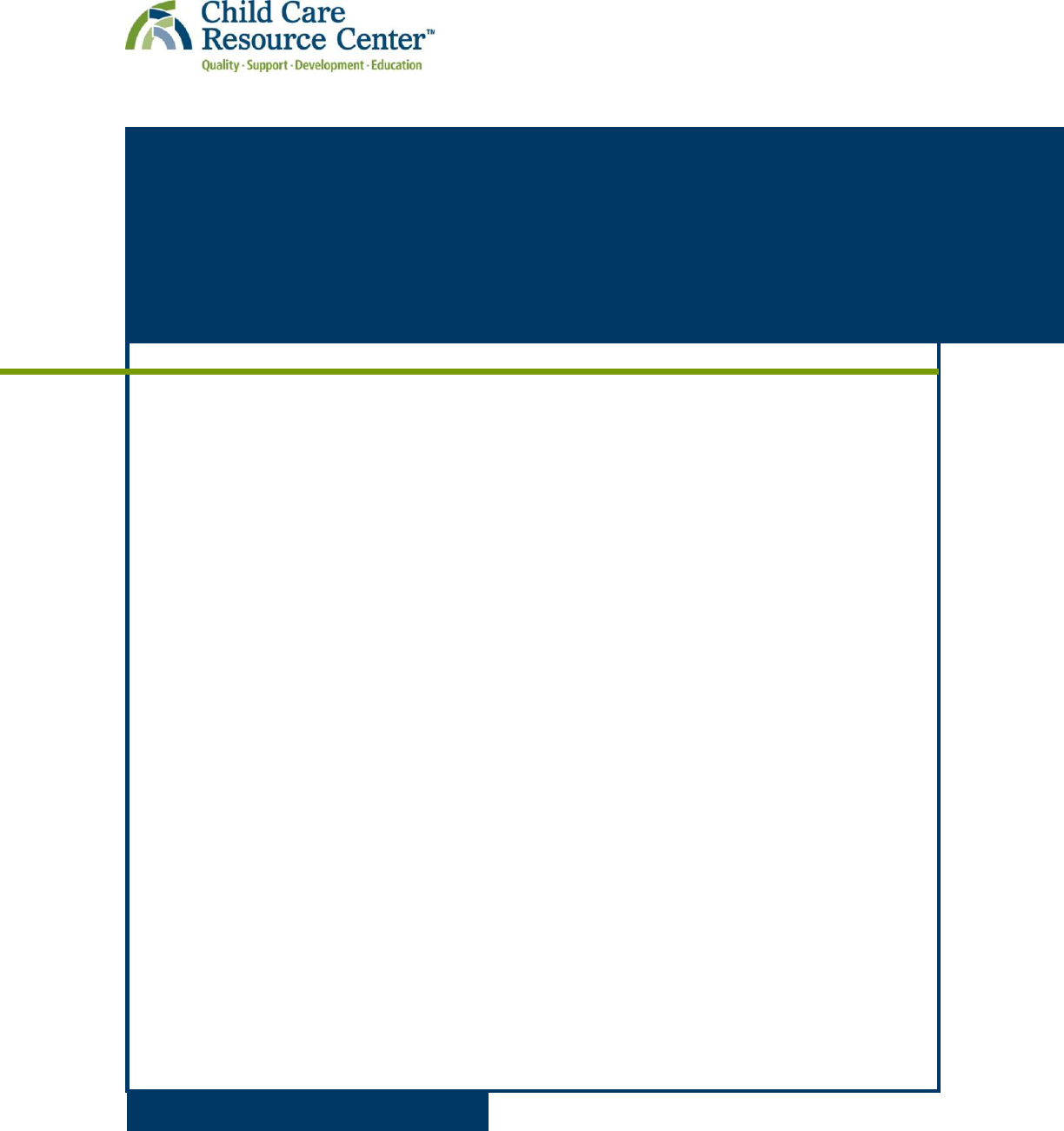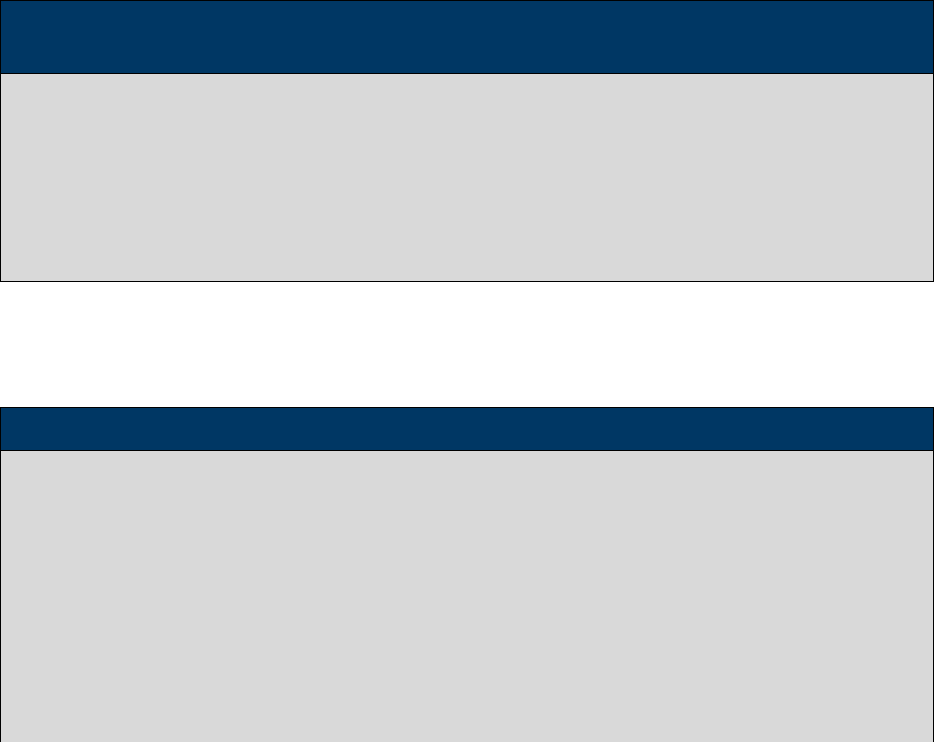
Effective July 1, 2023
CHILD CARE RESOURCE CENTER
PARENT AND PROVIDER HANDBOOK

Table of Contents
INTRODUCTION AND WELCOME ................................................................................................................... 1
CCRC Background ....................................................................................................................................... 1
Beginnings .............................................................................................................................................. 1
Vision Statement.................................................................................................................................... 1
Mission Statement ................................................................................................................................. 1
Organizational Values ............................................................................................................................ 1
PARENTAL CHOICE ......................................................................................................................................... 2
PROGRAM RULES OVERVIEW ........................................................................................................................ 2
General Child Care and Development Programs ....................................................................................... 2
Center-Based Program and Infant Toddler Program (CCTR) ................................................................. 2
California State Preschool Program (CSPP) ........................................................................................... 2
Head Start Programs .................................................................................................................................. 3
Head Start Preschool ............................................................................................................................. 3
Early Head Start ..................................................................................................................................... 3
Subsidized Child Care Programs ................................................................................................................ 3
CalWORKs Stage 1 Child Care (LA County Only ......................................................................................... 3
Enrolling in a CalWORKs Stage 1 Program ............................................................................................. 4
Recertification Process for CalWORKs Stage 1 ...................................................................................... 5
Transfer to CalWORKs Stage 2 ................................................................................................................... 5
Discontinuance and Appeal Procedure for CalWORKs Stage 1 ............................................................. 5
California Department of Social Services (CDSS) Child Care ..................................................................... 5
CDSS Program Eligibility Criteria ............................................................................................................ 6
CDSS Income Eligibility Criteria .............................................................................................................. 7
CDSS Need Criteria ................................................................................................................................. 9
Important Program Information .......................................................................................................... 13
Dis-enrollment, Appeal Rights, and Re-enrollment ............................................................................. 14
Procedure for Re-enrollment after Dis-enrollment ............................................................................. 15
PROVIDER CHOICE ....................................................................................................................................... 16
Providers that adhere to health and safety requirements:..................................................................... 16
Providers that are not subject to either educational or licensing standards: ......................................... 16
TrustLine Registry .................................................................................................................................... 17
Things to Consider Regarding Provider Choice ....................................................................................... 17
Megan’s Law ........................................................................................................................................ 17
Oliver’s Law .......................................................................................................................................... 18
PROVIDER GUIDELINES ................................................................................................................................ 18
Provider Relations and Expectations ....................................................................................................... 18
Independent Contractor ...................................................................................................................... 18
How Subsidized Care Works ................................................................................................................ 18
Things to Know .................................................................................................................................... 18
General Policies for Subsidized Providers ............................................................................................... 19
Subsidized Provider Document Requirements .................................................................................... 19
Moving Child Care Services to a New Location ................................................................................... 19
PROVIDER POLICY PROCEDURES ................................................................................................................. 20
Regional Market Rate (RMR) ................................................................................................................... 20
Rates and Policies .................................................................................................................................... 20
Rate Process ......................................................................................................................................... 20
Rate Guidelines .................................................................................................................................... 22
Procedure for Provider Closure Days (Days of Non-Operation) and Payment ................................... 23
PROVIDER AUTHORIZATION ........................................................................................................................ 24
CCRC PROVIDER PAYMENT POLICIES & PROCEDURES ................................................................................ 24
Payment Policies ...................................................................................................................................... 24
Fiscal Year ............................................................................................................................................ 25
General Attendance Document Procedure ......................................................................................... 25
General Information about completing Attendance Document ......................................................... 25
Completing the PPR ............................................................................................................................. 26
Incomplete PPRs .................................................................................................................................. 26
Helpful Tips for the Provider to Avoid Payment Delays ...................................................................... 26
Completing the Attendance Sheet ...................................................................................................... 27
Incomplete Attendance Sheets ........................................................................................................... 27
Helpful Tips for Providers to Avoid Payment Delays ........................................................................... 27
Submitting the Attendance Documents .............................................................................................. 27
Payment Timelines .............................................................................................................................. 27
Payment Procedures ................................................................................................................................ 28
Set Schedules ....................................................................................................................................... 28
Variable Schedules ............................................................................................................................... 28
Temporary Schedule Changes for Illness or Suspended Children ....................................................... 28
Child Care Monitoring .......................................................................................................................... 29
Payment Corrections ........................................................................................................................... 29
Child Care Fraud ....................................................................................................................................... 30
PROVIDER COMPLAINTS/ PROVIDER TERMINATION .................................................................................. 30
Complaint Policy ...................................................................................................................................... 30
Complaint Procedure ............................................................................................................................... 31
Provider Termination ............................................................................................................................... 31
Causes for Termination ........................................................................................................................ 31
Termination without Notice ................................................................................................................ 31
Voluntary Withdrawal from Participation ........................................................................................... 31
RESOURCE & REFERRAL (R&R) ..................................................................................................................... 32
Referral Services ...................................................................................................................................... 32
Provider Referral Policy ........................................................................................................................... 32
Child Care Referral System ...................................................................................................................... 33
Parent Education and Child Development Services ................................................................................ 33
Provider Outreach and Training .............................................................................................................. 34
Child Care Initiative Project (CCIP)........................................................................................................... 34
CCRC GENERAL POLICIES AND PROCEDURES .............................................................................................. 35
Equal Opportunity.................................................................................................................................... 35
Confidentiality.......................................................................................................................................... 35
Behavior Expectations ............................................................................................................................. 35
Expressing Appreciation/Gift Giving ........................................................................................................ 35
Suspected Fraud ...................................................................................................................................... 35
Parent Uniform Complaints/Grievances.................................................................................................. 36

1
INTRODUCTION AND WELCOME
Welcome to the Child Care Resource Center (CCRC). CCRC is committed to promoting optimal child
development and family well-being through access to quality child care.
CCRC Background
Beginnings
CCRC began as a volunteer organization in 1975, and when CCRC was incorporated in 1976, it began to
offer Resource and Referral (R&R) services. When the California Department of Education (CDE) awarded
CCRC a grant in 1976, the agency began to provide subsidies to parents/caregivers with self-reported
lower incomes to help with child care costs.
Vision Statement
Healthy and strong children and families living in thriving communities.
Mission Statement
CCRC cultivates child, family, and community well-being.
Organizational Values
The organizational values guide the way CCRC conducts business.
• We strive for excellence in all that we do.
• We create new and innovative ways to serve our community.
• We live our values through collaboration.
• We treat everyone with respect.
• We are dedicated to every client’s success.
• We act with integrity in our daily actions.
Diversity, Equity, & Inclusion Statement
To fulfill our mission, we commit to providing resources that promote equal access and opportunity for all
people. CCRC’s DEI mission is to acknowledge and embrace all backgrounds and identities of people. In all
we do, we strive for an equitable future for the children, families, and providers we serve.

2
PARENTAL CHOICE
CCRC provides federal and state child care subsidies to parents/caregivers in Los Angeles and San
Bernardino counties. We offer various child care programs funded through the California Department of
Social Services (CDSS) under the Child Care and Development Division (CCDD). CCRC must comply with
the regulations that govern these programs. A Parent has a full range of eligible child care programs and
settings that are provided, and it is their choice on the type of child care provider they prefer.
PROGRAM RULES OVERVIEW
Parents/caregivers enrolled in any of CCRC’s subsidized child care programs must understand and agree to
the following rules:
• Parents/caregivers are certified into the CalWORKs programs for at least twelve (12) months of
child care services.
• Parents/caregivers are certified into the Alternative Payment programs for at least twenty-four
(24) months of child care services.
• Parents/caregivers are recertified to continue eligibility for any subsidized child care program at
the end of their certification period.
• Parents/caregivers must complete all eligibility forms and provide required documentation as
requested at initial certification and recertification to meet program requirements.
• Parents/caregivers can request changes during the eligibility period through a voluntary request.
General Child Care and Development Programs
Center-Based Program and Infant Toddler Program (CCTR)
These programs are available throughout Los Angeles and San Bernardino County, with child care and
development services provided at specific sites. The sites must meet quality program standards the
California Department of Social Services (CDSS) set and utilize a developmentally appropriate curriculum
for instruction. Families access CCTR services through the site waitlist. As CCTR funding becomes
available, the most eligible families from the site waitlist receive assistance first. Families may remain in
the CCTR program as long as they continue to meet the need and eligibility criteria of the program, follow
the program rules and regulations, and funding is available.
California State Preschool Program (CSPP)
These programs are available throughout Los Angeles, with child care and development services provided
at specific sites. The sites must follow preschool curriculum standards set by the California Department of
Education (CDE). The center-based programs provide part-day and full-day services offering primary
lessons that are age-related, culturally, and linguistically appropriate for children of preschool age (3-year-
olds and four-year-olds). It also provides parental education and community referrals for participating

3
families. Families access CSPP services through the site waitlist. As CSPP funding becomes available, the
most eligible families from the site waitlist receive assistance first. Families with children enrolled in part-
day CSPP must meet the program’s eligibility criteria. Families with children enrolled in full-day CSPP must
meet the need and eligibility criteria of the program.
Head Start Programs
By focusing on the whole family, Head Start and Early Head Start programs both focus on giving families
the necessary resources to care for their children in healthy and productive ways. CCRC’s Head Start
program staff offer medical, dental, mental health, special needs, and nutrition services and many
opportunities for parents/caregivers to be involved in their child’s growth, development, and education.
Head Start Preschool
Head Start is for children aged three (3) to five (5) from families with income below the federal
poverty level who live in your local service area. The professional staff works with each child to
ensure that all necessary medical and dental exams are completed and provides young learners
with social and academic skills that prepare them for school. Children with disabilities are
integrated into the preschool environment, and parents/caregivers are assisted with any disability
services they may need for their child.
Early Head Start
The Early Head Start (EHS) program serves newborns to ages three (3) in a home-based program.
EHS is a federally funded community-based program for lower-income families with infants,
toddlers, and pregnant women. The program helps families care for their infants and toddlers
through early, ongoing, focused, and inclusive services like developmental screenings and home
visits. Its mission is simple:
• To promote healthy prenatal outcomes for pregnant women.
• To enhance the development of very young children.
• To promote healthy family functioning.
Subsidized Child Care Programs
CCRC’s subsidized child care offers families federal and state child care vouchers or certificates. Program
funding is through the California Department of Social Services (CDSS) under the Child Care and
Development Division (CCDD). They must comply with the regulations that govern these programs:
County of Los Angeles Stage 1 Contract and Title 5.
CalWORKs Stage 1 Child Care (LA County Only)
The Los Angeles County Department of Public Social Services funds CalWORKs Stage 1 subsidized child
care and sets the eligibility criteria. The Stage 1 subsidized child care program may serve families receiving
CalWORKs cash aid for themselves. Parents/caregivers are not required to demonstrate a need for child
care services to be approved.
4
Establishing Stage 1 Enrollment Eligibility
To establish eligibility for subsidized child care, parents/caregivers may request child care through their
Greater Avenues for Independence (GAIN) Worker, Eligibility Worker, or a CCRC representative. CCRC’s
Case Management Department will review the request to determine eligibility for child care services using
the following criteria:
• Parent/caregiver is receiving cash aid for themselves.
• For two parent/caregiver households, only one parent/caregiver needs to be CalWORKs eligible to
access CalWORKs child care services. Parents/caregivers must meet with their GAIN Services
Worker or Eligibility Worker to access the Stage 1 child care program.
• There must be at least one eligible child under thirteen (13) years old or a child with appropriately
documented special needs through eighteen (18) years old and living in the home.
• Stage 1 parents/caregivers have twelve (12) month eligibility for child care services. Once certified
or recertified, child care services will be given for twelve (12) months.
Enrolling in a CalWORKs Stage 1 Program
If eligibility for child care services is determined, CCRC will mail a CalWORKs Stage 1 Child Care Approval
Letter. Included with the letter will be a Participant Document Checklist (ST1-10A) that lists the paperwork
required for enrollment and the due date for the documents.
CCRC must receive all required paperwork listed on the ST1-10A within thirty (30) calendar days from the
date of the original letter confirming the receipt of the request. A twelve (12) month child care approval
Notice of Action (NOA) (ST1-12) will be issued if accurate and complete paperwork is received, and
eligibility is established.
Eligibility
A. Eligibility
• Parent/caregiver is receiving CalWORKs cash aid for themselves.
• At least one eligible child under thirteen (13) years old or a child with appropriately
documented special needs through eighteen (18) years old living in the home.
B. Approved Schedule
The NOA (ST1-12) authorizes twelve (12) months of full-time child care for the family unless part-
time child care is requested. CCRC pays for child care costs only:
• During the hours authorized for child care according to the approved schedule.
Parents/caregivers are responsible for the cost of care during non-authorized hours.
• If a family enrolls in a program that offers private education, CCRC will only pay for the part
of care needed for child care (not tuition).
• Before and after school care for school-age children (public school, homeschooling, etc.).
CCRC does not pay for educational hours.

5
Parents/caregivers may also be responsible for registration fees, co-payments, and any other fees the
provider may charge outside of tuition.
Recertification Process for CalWORKs Stage 1
During the yearly recertification, all parents/caregivers still receiving CalWORKs cash aid at the end of their
certification period are eligible for recertification in CalWORKs Stage 1. The recertification procedure is as
follows:
A. Before the authorized child care end date, CCRC will contact the parent/caregiver to verify if any
changes are necessary for the currently contracted child care schedule.
B. Once the Case Specialist has confirmed the parents/caregiver’s provider choice and child care
schedule, CCRC may reauthorize the case for another twelve (12) months.
C. Parents/caregivers who no longer receive CalWORKs cash aid are asked to provide information to
their Case Specialist to transfer their case to CalWORKs Stage 2.
Transfer to CalWORKs Stage 2
When a parent/caregiver is cash aid terminated, they are contacted by the Case Specialist in preparation
for the transfer to CalWORKs Stage 2.
To transfer the case, the following may be requested:
• Current gross monthly income
• Need for child care services (Employment, School, Seeking Employment, etc.)
Once this information is collected, child care services will continue in CalWORKs Stage 2 for an additional
twelve (12) months.
Discontinuance and Appeal Procedure for CalWORKs Stage 1
A. Discontinuance
If a parent/caregiver does not comply with DPSS or CCRC regulations, CCRC may terminate the
subsidized child care approval and/or take other action.
B. Appeal Procedure
If a parent/caregiver disagrees with any action taken by CCRC/DPSS, they will have ninety (90) days
to ask for an appeal hearing. The ninety (90) days will start the day after CCRC/DPSS gives or mails
the notice. Please see the back of the NOA and complete it as directed.
California Department of Social Services (CDSS) Child Care
Participation in California Department of Social Service (CDSS) programs is based on available funding and
the parent/caregivers' qualifications for the program.
The available child care programs under CDSS are CalWORKs Stage 2, CalWORKs Stage 3, Alternative
Payment, and Family Child Care Education Home Network. To receive subsidized child care services,
6
families must meet program eligibility, income eligibility, and need requirements at certification and every
subsequent recertification.
Parent/caregivers applying for the Alternative Payment program are placed on the waitlist and are
contacted in order of priority from the waitlist as vacancies occur.
The Child Care and Development Division (CCDD) provides the Income Rankings table to determine
admission priorities. Prior to the enrollment process, parents/caregivers are required to confirm program
eligibility for the ranks that are being enrolled.
Priority is given to families whose children are recipients of child protective services, or who are at risk of
being neglected, abused or exploited, upon written referral from a legal, medical, or social services agency.
All children and families who are not within the priority for admission shall be admitted in accordance with
family income, with the lowest income ranked families admitted first.
CDSS Program Eligibility Criteria
All programs must meet the following:
• The family's adjusted monthly income, based on family size, is at or below 85% of the State Median
Income (SMI). Parents/caregivers are provided a copy of the current year's SMI chart.
• The family includes a child under the age of thirteen (13) years or a child under the age of twenty-
one (21) with exceptional needs and/or severe disabilities.
• Parents/caregivers must report any changes to the family’s ongoing income that causes the
monthly income to exceed 85% of SMI within thirty (30) calendar days.
CalWORKs Stage 2
• The parent/caregiver is a current CalWORKs cash aid recipient or terminated from cash aid within
the last twenty-four (24) months.
CalWORKs Stage 3
• The parent/caregiver is a former CalWORKs cash aid recipient who has yet to receive cash aid
within the last twenty-four (24) months and is transferring from CalWORKs Stage 1 or 2.
Alternative Payment Program (CAPP)
• The parent/caregiver is on the agency waiting list, was referred by Child Protective Services (CPS)
or At-Risk Services, or the family is experiencing homelessness.
Family Child Care Education Home Network (CFCC)
• The parent/caregiver is on the agency waiting list, was referred by Child Protective Services (CPS)
or At-Risk Services, or the family is experiencing homelessness.
• The parent/caregiver only agrees to use a provider participating in the CFCC program.
7
CDSS Income Eligibility Criteria
Family Size
Family size shall be determined by the number of parents/caregivers and the children (for whom the
parents/caregivers are responsible) who comprise the household in which the child receiving services is
living.
A “parent” means a biological parent, stepparent, adoptive parent, foster parent, caregiver relative, legal
guardian, domestic partner of the parent, or any other adult living with the child who has responsibility for
the care and welfare of the child.
A parent will self-certify single-parent status under penalty of perjury on the Application for Services
(9600).
Children with Special Needs
If a parent/caregiver requests that a child(ren) remain in the program after the child's 13th birthday due to
special needs. In that case, the parent/caregiver must submit a copy of the portion of the child’s active
Individualized Education Plan (IEP) that contains all of the following:
• The name of the child.
• Information that the child qualifies as a child with special needs and what services are provided via
the plan.
• Active Period of the Plan.
A parent/caregiver must also submit a statement signed by a legally qualified professional stating that the
child requires the special attention of adults in a child care setting. This statement must include the legally
qualified professional rendering the opinion's name, address, license number, and telephone number.
Income
Income determines program eligibility and whether a parent/caregiver must pay a portion of the child care
cost (family fees). Parents/caregivers must provide documentation of all sources of income for themselves,
and any other adults included in the family size. Parents/caregivers must report all sources of income,
including but not limited to employment wages, self-employment earnings, child support, Social Security
benefits, CalWORKs cash aid, and pensions. If self-employed, the parent/caregiver may also submit a Self-
Employment Income and Expense Report with copies of business expense receipts to deduct expenses from
the total income.
• Regular and Steady Income
When a family’s income source does not include fluctuating income, the gross income from
one (1) full month will be used to calculate the family’s adjusted monthly income.
• Fluctuating Income
A family’s income source is considered to fluctuate when:
o Parent/caregiver receives additional money over the base pay due to intermittent,
occasional, sporadic, or infrequent earnings or income, including but not limited to
bonuses, commissions, lottery winnings, inheritance, back child support payment, or net
8
proceeds from the sale of real property or stock.
o Parent/caregiver receives migrant, agricultural, or seasonal work.
o Parent/caregiver has inconsistent and/or unstable employment or self-employment,
resulting in an inconsistent pattern of income.
When a fluctuating income source is received, the income calculation is completed by averaging
the total countable income from twelve (12) full months.
Family Fees
Family fees are based on total countable income, family size, and the hours of certified need for the
month. Fees are assessed at a part-time (less than 130 hours per month) or full-time (130 hours or more
per month) rate.
• Family fees are due by the 1st of the month.
• Payment is on time if received by the 7th of the month.
• Payment options for family fees include:
o Online through the CCRC Parent Portal is the preferred payment method by credit card,
debit card, or e-check.
o By phone with Visa or Mastercard in the parent’s name.
o In person at the CCRC office by credit card, debit card, money order, or personal check.
o Send via mail, money order, or personal check.
• Parents/caregivers are still responsible for payment of family fees even if the child is absent or on
vacation or the provider is closed for vacation or holidays.
• If a parent/caregiver cannot make the monthly payment, a call or email to the Case Specialist must
take place before the 7th of the month to arrange a payment plan.
• Once a payment plan has been arranged, parents/caregivers are responsible for paying the agreed-
upon plan amount plus the regular monthly fee.
• Existing payment plans may not be changed or added to, and additional payment plans may only
be made once the current plan reaches a zero balance.
All family fee payments received will be applied to the most delinquent family fees and/or payment plan
installments before they are applied to current fees and future installments.
When family fees are not paid in full and on time, CCRC issues a dis-enrollment Notice of Action (NOA) for
delinquent family fees.
• A check returned for non-sufficient funds (NSF) is viewed as non-payment, and child care may be
discontinued. In addition, the NSF bank fee is added to the total outstanding balance.
• Any credit card payments that end up being disputed are viewed as non-payment, and child care
may be discontinued.
If dis-enrolled from the program due to non-payment for family fees, parents/caregivers must pay all
9
unpaid family fees in full before re-enrolling in a subsidized child care program.
During the eligibility period, parents/caregivers may submit a Voluntary Change Request Form with
supporting documentation to reduce their family fees for the following:
• Income recalculation.
• Schedule reduction from full-time to part-time.
• Certifications and subsequent recertification, parents/caregivers eligible for full-time care may also
request to decrease the child care hours to part-time.
When approved, the new family fee amount will be effective the first of the month immediately following
the date of the new income calculation.
CDSS Need Criteria
In addition to meeting eligibility requirements, each parent/caregiver in the household must have at least
one of the qualifying needs listed below that prevents the parent/caregiver from caring for or supervising
the child(ren).
Employment
A parent/caregiver who is employed must submit a signed Employment Verification form completed by
both the parent/caregiver and employer that reflects the parents/caregiver’s employment information.
Employment at Home
In addition to the Employment Verification, a parent/caregiver who works from home must justify
requesting subsidized child care. Documentation must include the type of work, the age of the child(ren)
for whom services are sought, and the specific child care needs if the child is more than five (5) years old.
A parent/caregiver who is a licensed family child care home or individual license-exempt provider is not
eligible for services during business hours because the employment does not preclude the supervision of
the family’s child(ren).
CCRC will determine whether the parents/caregiver’s employment and the identified child care needs
preclude the supervision of the family’s child(ren).
Employment as an Assistant in a Large Licensed Family Child Care Home
In addition to the Employment Verification, a parent/caregiver who works as an assistant in a Large
Licensed Family Child Care Home will need to submit all of the following:
• A copy of the family child care home license indicating it is licensed as a large family child care
home.
• A signed statement from the licensee stating that the parent/caregiver is an assistant.
• Proof that the parents/caregiver’s fingerprints are associated with that licensed family child care
home as the assistant, which the Case Specialist may verify with the local Community Care
10
Licensing office.
• Verify that the licensee withholds payroll deductions for the parent/caregiver, which may be a pay
stub.
Self-Employment
A parent/caregiver who is self-employed is considered an independent contractor. The parent/caregiver
may be self-employed in a leased or constant space (i.e., barber, cosmetologist, nail technician) or self-
employed in variable locations (i.e., landscaper, domestic worker, day laborer).
A parent/caregiver who is self-employed must submit the following:
• Self-Employment Declaration Form: includes the name or nature of the business, business
address, work hours, and expected gross monthly income.
• Supporting Documentation: parents/caregivers must provide as many of the following to support
the days and hours of employment:
o Copies of business appointment logs, client receipts, job logs, mileage logs, a list of clients
with contact information, or, if applicable, a copy of the business license, workspace lease,
or workspace rental agreement.
Travel Time and Sleep Time for Employment
Travel time may be requested to and from the parents/caregiver’s child care provider and the place of
employment. Travel time can be at most half of the daily hours of employment or a maximum of four (4)
hours per day.
Sleep time may be requested if the employee's work hours are between 10:00 pm and 6:00 am. Sleep time
can be, at most, the number of hours authorized for employment and travel time.
Education and Training
CCRC may provide child care if a parent/caregiver is enrolled in an educational program (classes or courses
for English language learners (ELL), English as a second language (ESL) or obtaining a high school diploma,
General Education Development (GED) or a High School Equivalency (HSE) certificate) or in a vocational
training leading directly to a recognized trade, paraprofessional or professional career. A parent/caregiver
with a need of training will submit the following:
• Documentation from the education program or training institution that includes the name of the
educational or training institution and the days and hours of the current class schedule.
Time Limits for Education and Training
Child care services for education and/or training will expire once either of the following conditions is met:
• A maximum of six (6) years from the initiation of services for training or educational services and
begins with the first approved NOA.
• Twenty-four (24) semester units, or its equivalent, after receiving a bachelor’s degree.
Online or Televised Classes
11
Must be from an accredited training institution recognized by the United States Department of Education.
Unit-bearing classes shall be counted as class time for each unit at one (1) hour a week.
Travel Time for Education or Training
Travel time may be requested and authorized for travel to and from the child care provider and the
educational or training institution. Travel time will be determined based on actual travel time needed, to
be at most a maximum of four (4) hours per day.
Study Time
Study time may be requested and authorized as follows:
• Two (2) hours per week per academic unit in which the parent is enrolled.
• On a case-by-case basis, a parent/caregiver may request additional study time upon completing the
Request for Additional Study Time form and signing under penalty of perjury the reason why extra
time is needed for the specified course(s). Additional time may be at most one (1) hour per week
per academic unit in which the parent/caregiver is enrolled.
Adequate Progress of Educational or Training Goal
Ongoing eligibility for training is contingent on making adequate progress. Therefore, at recertification, the
parent/caregiver must provide a progress report, grades, unofficial transcript, or documentation of
adequate progress from the most recently completed quarter, semester, or training period.
• Earn a 2.0-grade point average or above in a graded program.
• In a non-graded program, pass the program’s requirements in at least fifty (50) percent of the
classes or meet the training institution’s standards for making adequate progress.
Failure to Make Adequate Progress
The first time a parent/caregiver fails to make adequate progress, they will be placed on Academic
Probation. The parent/caregiver may be recertified and continue receiving child care services for the
eligibility period.
If, after this period, the parent/caregiver fails to make adequate progress, the family will be suspended
from receiving child care services for educational or vocational training for six (6) months.
Seeking Employment/Job Search
A parent/caregiver may qualify for subsidized child care while looking for work. The following guidelines
apply:
• Parents/caregivers will be required to sign a Seeking Employment Agreement under penalty of
perjury stating the parents/caregivers plan to secure, change, or increase employment and hours
needed to seek employment. In the agreement, the parent will note whether a set or variable
schedule is necessary to seek employment.
• This is a part-time benefit, and a parent/caregiver may seek employment at most five (5) days per
week and for less than thirty (30) hours per week for job search activities.
12
• Appropriate job search activities include:
o Going to businesses and filling out applications.
o Attending job interviews.
o Visiting local EDD One-Stop Centers.
o Developing a resume, visiting the GAIN office for job referrals, or using the internet to
search and apply for jobs or work on a resume.
Incapacity
If the primary basis of a parents/caregiver’s need is incapacity, a parent/caregiver may be able to receive
subsidized child care services. A Statement of Parental Incapacity form must be completed by a legally
qualified health professional.
CCRC may contact the legally qualified health professional for verification, clarification, or completion of
the medical statement. The form must include the following:
• A release signed by the parent/caregiver authorizing the legally qualified health professional to
disclose information necessary to establish incapacity.
• Statement by the legally qualified health professional that you are incapacitated.
• Recommended days and hours per week that child care is needed because of the incapacity.
• The professional’s name, address, telephone number, license number, and signature.
• Child care hours can be at most fifty (50) hours per week.
Seeking Permanent Housing
If a parent/caregiver is seeking permanent housing for family stability. In that case, the parent/caregiver
must complete a Self-Declaration of Homelessness or Seeking Permanent Housing form that includes a
statement that the parent/caregiver requires child care while seeking permanent housing and that the
parents/caregivers plan to secure a fixed, regular, and adequate residence.
• This is a part-time benefit; a parent/caregiver may seek housing for up to five (5) days a week and
less than thirty (30) hours per week.
Protective Services
When a family’s need is protective services, the children require care because they are currently
experiencing or have been deemed at increased risk for abuse, neglect, or exploitation. Receiving early
learning and care services is a means of reducing or eliminating exposure to those conditions.
Parents/caregivers must submit a written referral within six (6) months immediately preceding the date of
application for services. The referral must contain the following information:
• For children with county Child Protective Services: the referral must be completed by the local
county welfare department's child protective services unit, must certify that the child is receiving
child protective services, and that child care services are a necessary component of the child
protective service plan.
13
• For children "at-risk": the referral must be completed by a legally qualified professional from a
legal, medical, social service agency, local educational agency liaison for youth and children
experiencing homelessness, Head Start program, or an emergency or transitional shelter. It must
include a statement that the child is at an increased risk of abuse or neglect and that child care
services are needed to reduce or eliminate that risk.
• The probable duration of the protective service plan and the specific hours and days that child care
is requested.
• The name, address, telephone number, and signature of the individual making the referral.
• If the written referral specifies that it is necessary to exempt the family from paying a fee, the
parent/caregiver will not be required to provide income documentation.
Community Service
When a parent/caregiver is assigned to a Welfare-to-Work Activity by their County Service Worker, they
may qualify for child care services under Community Service. In the CalWORKs program, Community
Service is a temporary and transitional activity performed with a private or public non-profit organization.
A Community Service Verification form is completed by the parents/caregiver’s supervisor at the
Community Service site.
Important Program Information
Approved Schedules
Child care services are only granted when:
• Each parent/caregiver in the household has a qualifying need that prevents the care and
supervision of the family’s child for some part of the day.
• There is no parent/caregiver in the family capable of providing care for the family’s child when care
is requested.
• The school or another person or entity is not otherwise supervising the child.
An NOA is issued to notify the parent/caregiver of the authorized child care based on the approved
eligibility and need of the parent/caregiver. Parents/caregivers may be approved for a set or variable
schedule. In a two-parent household, the schedules of both parents/caregivers must be considered when
determining child care hours.
• Set Schedules are predictable and include the same hours and same days every week.
o Example: Monday through Friday, 8:00 am to 5:00 pm.
• Variable Schedules are schedules that change from day to day within a week, along with hours that
may vary from day to day. Variable schedules are inconsistent and/or unstable.
o Example: Monday through Friday, varied 20 – 40 hours per week
Voluntary Notification of Changes
14
When parent/caregiver needs to request changes to their case, they must do so in writing using the
Voluntary Change Request (VCR) Form:
• To reduce family fees.
• Change the child care schedule.
• Request a temporary suspension of service.
The VCR form includes a statement where the parent/caregiver must acknowledge that they have a right
to retain the service level determined at initial certification or recertification and confirms that no changes
will be made to the family’s case other than what is requested on the form.
Parents/caregivers must also submit additional documentation supporting the requested change before
the agency can take action.
Parents/caregivers will be notified of the outcome with a NOA within ten (10) business days of receiving
complete documentation supporting the VCR form.
Dis-enrollment, Appeal Rights, and Re-enrollment
When a parent/caregiver does not follow CCRC or CDSS rules and regulations, the family’s services will be
subjected to dis-enrollment.
Appeal Rights
If CCRC dis-enrolls a family’s child care services or a parent/caregiver disagrees with any action taken by
CCRC staff. In that case, parents/caregivers have the right to file a local appeal within nineteen (19)
calendar days of the effective date on the NOA.
Local Appeal Hearing Procedure
Parents/caregivers may appeal the intended action and request an appeal hearing in writing, in person, by
telephone, email or fax within nineteen (19) calendar days of the effective date on the NOA.
Once an appeal request is received, the intended action as stated on the appealed NOA, will be suspended
until the appeal process has been completed. Please note that while in appeal, parents/caregivers are
expected to remain compliant and follow CCRC and CDSS program rules and regulations. Resolution of this
matter shall not prohibit CCRC from issuing a subsequent NOA to your family for issues related to the
subsidized child care program.
• Within ten (10) calendar days following CCRC’s receipt of the appeal request, the agency will notify
the parent/caregiver of the date and time of the hearing. Parents/caregivers can have the hearing
through a video or phone conference call.
• Parents/caregivers may also request an authorized representative attend the hearing on their
behalf by having the authorized representative complete the Authorized Representative for Local
Appeal Hearing Form.
• CCRC will consider the appeal abandoned if the parent/caregiver or authorized representative does
not attend the hearing.
15
• CCRC does allow a one-time rescheduled appointment per the appeal hearing request. CCRC will
consider the appeal abandoned if the parent/caregiver or authorized representative does not
attend the hearing.
Appeal Hearing
The parent/caregiver must bring evidence supporting the appeal request.
Within ten (10) calendar days following the appeal hearing, the parent/caregiver will receive a CCRC
decision letter via email or mail.
Appeal Procedure for CDSS
If the parent/caregiver disagrees with CCRC’s written decision, the parent/caregiver will have fourteen
(14) calendar days to appeal to CDSS by following the instructions on the back of the NOA. The appeal
must include the following:
• A written statement specifying the reasons the parent/caregiver believes CCRC’s decision was
incorrect.
• A copy of the agency's decision letter and a copy of both sides of the NOA.
CDSS will review these items along with case documentation relevant to the appeal. Within thirty (30)
calendar days after the receipt of the appeal, CDSS will issue a written decision to the parent/caregiver
and CCRC. If the appeal is denied, CCRC will dis-enroll the family.
Procedure for Re-enrollment after Dis-enrollment
If CCRC dis-enrolled parent/caregiver from the CalWORKs Stage 2 program because the parent/caregiver
did not comply with CCRC or CDSS regulations, the parent/caregiver may be eligible to reapply and be re-
enrolled for services. To be considered for re-enrollment:
• The parent/caregiver must take steps to correct the issue that resulted in dis-enrollment.
• The parent/caregiver must meet the eligibility and need requirements at the time of re-enrollment.
• Parent/caregiver must be within the twenty-four (24) month time period after termination from
cash aid.
• The parent/caregiver must pay all delinquent family fees in full before re-enrolling into a subsidized
program.
If CCRC dis-enrolled parent/caregiver from the CalWORKs Stage 3, Alternative Payment or Family Child
Care Education Home Network (CFCC) Program because parent/caregiver did not comply with CCRC or
CDSS regulations:
• Parent/caregiver may contact CCRC and ask to be added to the Eligibility List.
• The parent/caregiver must pay all delinquent family fees before re-enrolling in a subsidized
program.

16
PROVIDER CHOICE
Parents/caregivers enrolled in a subsidized child care program have a parental choice regarding the child
care provider they select.
Providers that adhere to health and safety requirements:
These programs are licensed and monitored by the Community Care Licensing Division of CDSS. They
provide preventive, protective, and quality services to children in care by ensuring that licensed facilities
meet established health and safety standards through monitoring facilities, providing technical
assistance, and establishing partnerships with providers, parents/caregivers, and the child care
community.
The parent/caregiver is responsible for evaluating and considering the value of educational programs
offered during child care.
Below is a list of providers that follow the health and safety requirements:
Licensed Family Child Care Homes
• Cares for small groups of children in a residential building such as a house, apartment, or condo
unit.
Licensed Child Care Center
• They are larger and care for more children. They are usually divided into groups or classrooms of
similar ages. Staff working for a Child Care Center must meet the requirements of the Community
Care Licensing Division.
Licensed -Exempt Center
• CCL does not regulate license-exempt centers, but other government agencies may monitor their
activities. These operate as child care centers but are exempt from the licensing requirement per
Title 22, and these centers most commonly consist of After-School Programs.
Providers that are not subject to either educational or licensing standards:
License-exempt providers do not have to adhere to licensing regulations to receive payment from state
or federal child care programs. License-exempt providers may be utilized because of the flexibility they
provide the parent/caregiver, a family environment with the same values and culture as the
parent/caregiver, and/or the ability to accommodate non-traditional work schedules. License-Exempt
providers can be a relative, friend, or neighbor and include:
• Relative License-Exempt Provider cares for children of relatives and may also care for children of
one non-related family.
o CDSS and DPSS define relatives to be aunts, uncles, and grandparents. Siblings, great-
aunts/uncles, great-grandparents, and cousins are considered non-relative providers and
must undergo the Trustline Registry process.
o Falsifying the nature of the provider's relationship with the child is considered fraud and

17
will result in the disenrollment of child care services with the provider.
o If a provider is a relative license-exempt provider and cares for children of a non-related
family, the provider must meet the non-related guidelines in this handbook.
• Non-Relative License-Exempt Provider cares for children unrelated to them.
o They may care for children of one non-relative family. The provider must be registered
with the TrustLine Registry and have had a negative Tuberculosis (TB) test in the past year.
o CCRC may only approve and pay for child care services after the provider has cleared a
background screening and TrustLine Registry.
o If TrustLine Registry is denied, closed, or revoked at any time, CCRC will terminate its
agreement with the provider.
• In-Home License-Exempt Provider cares for children in the parent/caregiver’s home. The
parent/caregiver acts as an employer to exempt in-home child care providers. The
parent/caregiver is responsible for following employer-related laws, such as those related to state
disability and federal and state unemployment taxes under the Fair Labor Standards Act. An in-
home exempt provider may be a related or non-related provider.
o The parent/caregiver must sign an In-home Affidavit stating that all federal and state
employment laws will be followed.
TrustLine Registry
The California Legislature created TrustLine to offer parents/caregivers, employment agencies, child care
resources, and referral programs, and child care providers access to a background check conducted by
CDSS. The background includes a review of the California Criminal History System and Child Abuse
Central Index (CACI) at the California Department of Justice (DOJ) and a check of Federal Bureau of
Investigation (FBI) records.
The TrustLine Registry consists of child care providers who have submitted an application to CDSS and
their fingerprints to the DOJ background clearance process.
Individuals listed on TrustLine do not have the following:
1) Disqualifying criminal convictions listed on the California Criminal History System.
2) Substantiated reports of child abuse listed on the CACI.
3) Disqualifying criminal convictions listed on the FBI Criminal History System.
Things to Consider Regarding Provider Choice
Megan’s Law
All states are mandated to develop notification procedures that allow the public access to information
about sex offenders in the community. At CCRC, we want to help keep our families and providers safe and
well-informed. For more information, visit California Megan’s Law at https://www.meganslaw.ca.gov.

18
Oliver’s Law
When a parent/caregiver contacts CCRC to request child care referrals, our referral staff will advise the
parent/caregiver of their right to obtain licensing information from the licensed providers that the
parent/caregiver may visit and how to access their public files. We strongly recommend that
parents/caregivers review the potential child care provider's licensing history before placing their child in
care. For more information, visit Community Care Licensing at
https://www.cdss.ca.gov/inforesources/community-care-licensing.
CCRC is not responsible for arrangements and contracts between parents/caregivers and child care
providers.
PROVIDER GUIDELINES
Provider Relations and Expectations
Independent Contractor
A provider is considered an independent contractor when they become a CCRC subsidized child care
provider. What this means is:
• The provider works for themselves.
• Is not an employee of CCRC and not an agent of CCRC.
How Subsidized Care Works
• A family applies to CCRC for a subsidized child care payment program.
• The family qualifies and enrolls in a CCRC program. The family chooses a child care provider.
• CCRC reimburses providers on behalf of the family.
Things to Know
• The provider must be at least eighteen (18) years of age.
• The provider must provide CCRC with the physical address where child care is taking place.
• Do not attempt to use CCRC as a reference for any reason – loans, employment, etc. CCRC does not
provide letters of recommendation.
• The provider and their employees do not qualify for CCRC insurance benefits. The provider will hold
CCRC harmless for any negligent acts committed by the provider or their employees, including any
injuries to children.
• CCRC logo is not permitted on the provider’s literature, promotional items, or marketing materials.
• The provider shall pay, when and is due, all taxes incurred as a result of all payments issued by
CCRC. All providers who receive income from CCRC will receive a 1099-MISC tax statement except
those identified as corporations on the W-9.

19
• If the provider is no longer caring for the child, the provider must notify CCRC upon the last day of
care.
• For general provider inquiries, such as address changes, phone number updates, payment options,
etc., contact the Provider Liaison Department for your local office.
General Policies for Subsidized Providers
Subsidized Provider Document Requirements
Subsidized services as a provider may begin after CCRC sends written authorization. Once CCRC receives
the correct and signed paperwork, the agency will process the information and recognize the provider as
an eligible subsidized provider.
The child care provider must select one of the following options to receive child care payments from CCRC.
• Payment Option #1: Direct Deposit
• Payment Option #2: Provider Pay Card (PPC)
When completing provider forms:
• Use ink only, no pencil.
• Do not use whiteout or correction tape.
• Submit originals when requested.
Note: Providers should inform CCRC of any changes that may affect the direct deposit or PPC (i.e.,
close bank account, change banks, change in TAX ID, change in address).
Moving Child Care Services to a New Location
Based on the provider’s information, CCRC has entered into an agreement with the provider, including the
address where services will be provided. Therefore, if there is a change of address or the opening of
another site, the provider must notify CCRC of these changes.
Before a change of address occurs, CCRC must be notified. Updated paperwork must be provided to
continue with child care services:
• CCRC will send the provider all the required documents to complete.
• CCRC will delay reimbursement until all updated documents have been received.
• Please note: Mail sent to the previous address will not be forwarded to the new address and will be
returned to CCRC. If CCRC receives a 2
nd
mail return, care will be dis-enrolled immediately if the
provider is licensed. Exempt providers will be dis-enrolled within thirty (30 days) unless a new
complete change of address packet is received. All required documents must be submitted to
update the address immediately to prevent a payment delay.
A. If the provider is licensed, they must also:
• Notify Community Care Licensing Division.

20
• Apply for a new license if continuing to provide child care services.
• A copy of the new license and change of address packet must be forwarded to CCRC.
• CCRC may use the license's effective date for reimbursement if all necessary documents are
submitted on time.
B. If child care is no longer offered at the new site location, the provider must:
• Contact CCRC about plans to move.
• Provide the names of the child(ren) for which child care services will no longer be available.
• Provide a W-9 with the new address to mail income tax forms.
PROVIDER POLICY PROCEDURES
Regional Market Rate (RMR)
The RMR is set by the California Department of Social Services (CDSS) Child Care and Development Division
(CCDD). The RMR is the maximum rate CCRC can reimburse for child care services, and it may increase or
decrease at any time. For the current Regional Market Rates, visit Reimbursement Ceilings for Subsidized
Child Care at https://rcscc.adm.dss.ca.gov/index.aspx.
CCRC applies the following guidelines based on the RMR set by CDSS/CCDD:
• The geographic area of the provider.
• Authorized child care hours and days.
• Reimbursement type– hourly, daily, weekly, and monthly.
• Age of the child.
CCRC cannot authorize rates above the established RMR ceiling. A provider may arrange with
parents/caregivers to pay the difference if rates are higher than the established RMR ceiling.
• Co-payments: When the provider arranges for a parent/caregiver to pay the difference between
the provider's rate and the rate CCRC authorizes, it is called a co-payment. CCRC is not responsible
for co-payment arrangements between the provider and the parent/caregiver.
Rates and Policies
Rate Process
The provider must submit the required documents to CCRC for review, including the provider’s child care
fees and policies before child care services can begin. Please keep in mind that:
• Public rates for unsubsidized families must be the same for CCRC-subsidized families.
• CCRC will request the submission of a pamphlet or flyer.
• Please remember that rates will remain in effect unless notified of any changes, has an expiration
21
date, or is year specific.
• A change in the RMR may affect the current reimbursement rate compared to the rate sheet on
file.
• For centers or private schools operating extended child care (before/after school care, Summer
Camp, Winter Camp), rates must be separate from school tuition and other school-related fees.
Completing the Family and Child Care Center Statement (required for CDSS providers)
• Use ink; do not use a pencil.
• Provide all requested information.
• Neatly cross out and initial if any mistakes are made. Do not use whiteout or correction tape.
• Attach the facility brochure/flyer that includes the schedule of fees or a rate chart on letterhead.
• Attach all policies that will assist us in calculating reimbursement (absence policy, closure days,
scholarships, etc.).
• Sign and date the Family and Child Care Center Statement.
Completing the ST1-05 Parent/Provider Service Agreement (required for CalWORKs Stage 1 providers)
• Use ink; do not use a pencil.
• Provide all requested information.
• Neatly cross it out and initial any mistakes that are made. Do not use whiteout or correction tape.
• Sign and date the agreement.
Licensed Providers Only: Attach a copy of the facility license and facility brochure/flyer that includes the
schedule of fees or a rate chart on letterhead and all policies that will assist us in calculating the
reimbursement (absence policy, closure days, scholarships, etc.).
Rates for Children with Special Needs
The provider may qualify for a special needs care rate if care is provided for a child with disabilities.
To apply for a Special Needs Care Rate, the provider must:
• Complete the Provider's Statement for Special Needs Request stating the additional services and
accommodations required to care for the child.
• Submit documentation demonstrating how caring for the child will have an ongoing financial
impact.
• The parent/caregiver should request all the necessary documents and take them to their provider
for completion.
The Americans with Disabilities Act (ADA) is a federal civil rights law that protects children and families
with special needs. The law states that the parents/caregivers of children with special needs are entitled to
all licensed child care facilities. Child care providers are required to consider caring for and

22
accommodating children with disabilities on a case-by-case basis.
Rate and Policy Change Request
The provider may request a rate change/addition at any time of the year as needed.
• CalWORKs Stage 1 providers:
o Submit a new ST1-05 to CalWORKs Stage 1. In addition, licensed providers must submit a
copy of their facility brochure/flyer.
o CCRC will send an Approval Provider Notification (ST1-06) once the new rates have been
approved.
• CDSS providers – CalWORKs Stage 2, CalWORKs Stage 3, CFCC, and CAPP:
o Licensed providers will submit a Family and Child Care Center Statement (CCRC will provide
the document) along with the facility brochure/flyer. All required paperwork will be
returned to the Provider Liaison Department.
• Notification will be sent to the provider if the rate change is approved.
If CCRC Receives
If approved, the Rate is
Effective
Example
On or before the
20
th
of the month
The 1
st
day of the
following month
If CCRC receives the rate change request on
November 20, if approved, it will be
effective December 1.
On or after the 21
st
of the month
The 1
st
day of the 2
nd
month
If CCRC receives the rate change request on
November 21
,
if approved, it will be
effective January 1.
Rate Guidelines
All Child Care Providers
TIME-FRAME
DETAILS
Hourly
Parent/caregiver has a child care need of fewer than ten (10) hours
per week and less than six (6) hours per day.
Daily
The parent/caregiver has a child care need of two (2) days or less per
week and a minimum of six (6) hours per day.
Part-time Weekly
The parent/caregiver has a child care need of three (3) or more days
per week and at least ten (10) hours but less than 30 hours per week.
Full-time Weekly
The parent/caregiver has a child care need of three (3) days or more
per week and 30 hours or more per week.

23
Part-time Monthly
Parent/caregiver has a child care need of ten (10) hours or more per
week and less than 30 hours per week, and that need occurs every
week of the month.
Full-time Monthly
The parent/caregiver has a child care need of 30 hours or more per
week, which occurs every week of the month.
Fee-Related Payment Policies
Providers should discuss fee-related policies with each parent/caregiver before beginning to provide child
care services to the child(ren).
A. Deposits and Registration Fees
• Deposits: CCRC does not pay deposits or any other type of advance payment to reserve a slot
for a child.
• Registration Fees: CCRC may pay registration fees when included in the licensed provider
policies if their rates are within the RMR limits and are not higher than those for non-subsidized
families.
B. Late Fees
CCRC does not pay late fees for parents/caregivers whose child is not picked up by the scheduled
time or by the close of the business day, and the parent/caregiver is responsible for late fees.
C. Academic and Other School Fees
CCRC does not pay:
• Private or public school-related fees for kindergarten and primary grades, tuition, books,
uniforms, etc.
• Any meals, transportation, field trips, or activities that are not included in the basic child care
rate.
D. Two-Week Notice
State law does not allow payment of two (2) providers for the same period.
• If a parent/caregiver chooses to end care and remove their child immediately, payment will end
the last day child care was used.
• If a provider (by contract) requires a two-week notice, the parent/caregiver will be responsible
for paying that notice.
Procedure for Provider Closure Days (Days of Non-Operation) and Payment
• Licensed Providers Only
o CCRC may reimburse the provider according to their written policies for up to ten (10) days
of non-operation (closure days) per fiscal year (July 1 – June 30) if:

24
▪ The provider submitted a policy listing the days when the child care site will be
closed, and no services will be available to families and their children.
▪ Provider usually requires payment from non-subsidized families, and charges are
noted in the provider policies, which are on file with CCRC.
▪ The day of non-operation falls on a day the child is authorized to attend.
• License-Exempt Providers
o CCRC does not reimburse license-exempt providers for days they are closed.
PROVIDER AUTHORIZATION
To authorize a provider in CalWORKs Stage 1, CCRC receives a CalWORKs Stage 1 Child Care Participant-
Provider Service Application (ST1-05). Once received, CCRC approves child care services with the provider
and sends the Approval Notice (ST1-06). To authorize a provider in CDSS (CalWORKs Stage 2, Stage 3,
CFCC, CAPP), the provider submits a completed provider packet. Once the provider packet is processed, a
Child Care Certificate with the approval will be sent to the provider. The approval includes the following:
• Start date of the approval – the first date subsidized child care services can begin.
• End date – last day of the authorized period.
• Hours of the approved child care schedule.
• Rate of reimbursement.
• CCRC will not pay for child care services before the start date, after the end date, or for hours not
listed on.
o the ST1-06 unless you receive a new ST1-06
o the Child Care Certificate unless the provider received a new notice extending child care.
• CCRC will notify the provider of all changes to the authorized schedule.
CCRC PROVIDER PAYMENT POLICIES & PROCEDURES
Payment Policies
CCRC will consider the parent's/caregiver's needs (work, school, training, maternity leave, or disability
reasons etc.), child's age, hours of child care, provider rates, and the RMR when determining the
authorized schedule and rates. CCRC will process payment to the provider based on the certified hours of
child care detailed on the CalWORKs Stage 1 Approval Provider Notification (ST1-06) or CDSS Child Care
Certificate. In addition, documentation about the child’s attendance is needed from the provider to
determine reimbursement. For CalWORKs Stage 1, the child care hours are reported on the Provider
Payment Request (PPR). For CDSS, the child care hours are reported on the Attendance Sheet.

25
For inquiries about receiving, printing, or payment for PPR's or Attendance Sheets, the provider may
contact the Provider Payments Department.
Phone
Email
PPR’s
(818) 717-1000 ext. 9211
ST1paym[email protected]
Attendance Sheets
(818) 717-1000, ext. 9210
Fiscal Year
CCRC operates during a fiscal year timeline that begins July 1 and ends June 30 and will only pay
documents for child care provided during the below timeline:
• PPRs: the current fiscal year and the immediate prior fiscal year. PPRs for the previous fiscal year
must be submitted by the last business day of May in the current fiscal year. For example, CCRC can
process PPRs for July 2022 – June 2023, plus July 2021 – June 2022. PPRs for July 2021 – June 2022
are due no later than May 31, 2023.
• Attendance Sheets: the current fiscal year only. An Attendance Sheet must be submitted within
sixty (60) calendar days following the close of the fiscal year for payment to be processed.
The provider should report and resolve all payment issues before the fiscal year ends.
General Attendance Document Procedure
PPRs and Attendance Sheets are provided monthly to providers (for each child) after care has been
authorized. Once the provider is registered for the Provider Portal, PPR(s) and Attendance Sheets may be
downloaded and printed monthly throughout the authorization period.
PPRs and Attendance Sheets must always remain in the provider’s possession. The provider must
complete a separate document for each child. If printing from the Provider Portal, documents cannot be
printed double-sided (ex. having two children on each side of the page). One single-sided document must
be printed per child. An altered document will be returned to the provider.
General Information about completing Attendance Document
PPRs and Attendance Sheets are signed under penalty of perjury by both parent/caregiver and provider,
certifying that the child care was provided based on the certified need of the parent/caregiver. Child care
used for any reason other than participating in an approved activity (work, school, training) does not
qualify for a subsidized payment. The parent/caregiver is responsible for such child care costs. The
parent/caregiver is responsible for child care exceeding authorized rates and hours.
Falsifying information such as indicating child care hours and reporting days that were not provided and/or
forging a parent’s/provider’s signature is considered fraud.
26
Completing the PPR
PPRs with all required elements completed will ensure accurate payment to the provider. A “How to
Complete a PPR” document is available through the Provider Portal or may be mailed to the provider upon
request. The PPR should include the following:
• Pre-printed information that has not been changed. If any pre-printed information needs to be
corrected, do not correct it. Instead, contact CalWORKs Stage 1 Case Management to report
changes.
• The total number of child care hours and days provided for the week is separated by daytime hours
(6 am to 6 pm), evening hours (6:01 pm to 5:59 am), and daily hours for Saturday and Sunday.
• Documented reason for child absence (sick, vacation) and/or provider closure(s) in the blank space
of the PPR or attach a note.
• Child care hours are handwritten and not typed.
• Errors crossed out, and correct information was added.
• Signatures from both the parent/caregiver and provider.
• Invoiced amount(s).
o For hourly, daily, or weekly rates, complete the "Amount Provider is Claiming" each week
and total up all weeks in the "TOTAL" box. Please make sure the weekly totals add up.
o For monthly rates, fill in the "TOTAL" box at the bottom. Leave the weekly boxes blank.
Incomplete PPRs
PPRs will be reviewed for accuracy and completeness prior to issuing payment. PPRs with errors will be
returned to the provider for corrections.
Unsigned PPRs are not payable and will be returned to the provider. If the provider is unable to reach the
parent/caregiver to obtain the parent’s/caregiver's signature, a letter of explanation must be attached to
the PPR. CCRC will attempt to reach the parent/caregiver through Stage 1 Case Management and, if
applicable, forward the unsigned PPR to the Department of Public Social Services (DPSS) for review. This
will cause a delay in the provider's payment.
Helpful Tips for the Provider to Avoid Payment Delays
• Have a daily log for each child of the hours provided.
• Complete the total number of hours and days for each week on the PPR. Ensure that the correct
number of daytime hours (6:00 am-6:00 pm) and evening hours (6:01 pm-5:59 am) are
documented in the correct columns.
• Add the weekly invoice amounts to the total amount claimed (total box).
• Verify pre-printed information on the PPR.
• Complete and submit PPRs after the service month has ended.
• Keep copies of PPRs for provider records.
• Update CCRC on address changes. CCRC mails PPRs and Direct Deposit Notifications to the address
on file.
• Use the return envelope provided by CCRC if mailing the PPR.
27
Completing the Attendance Sheet
Attendance Sheets completed correctly with all required elements ensure an accurate payment to the
provider. A “How to Complete an Attendance Sheet” document is available through the Provider Portal or
may be mailed to the provider upon request. The Attendance Sheet should include the following:
• Pre-printed information that has not been changed (except for am/or pm when providing overnight
care).
• The exact in/out times (including a.m. or p.m.) documented daily.
• Reason for child absence (sick, vacation) on the notes section.
• “Closed” for provider closure days.
• Child care hours are handwritten and not typed.
• Signatures from both the parent/caregiver and provider.
• Invoiced amount(s) for Licensed Providers.
Incomplete Attendance Sheets
Once submitted, attendance sheets cannot be corrected as these are legal documents signed under
penalty of perjury. Attendance sheets will be reviewed for accuracy and completeness before issuing
payment. Errors on attendance sheets may affect payment. CCRC may contact the provider if the
attendance sheet(s) needs to be completed.
Helpful Tips for Providers to Avoid Payment Delays
• Update CCRC on address changes.
• Complete Attendance Sheets daily.
• Complete and submit Attendance Sheets after the service month has ended.
• Keep copies of Attendance Sheets for provider records.
• Review the Attendance Sheet before submitting it to avoid errors/omissions.
Submitting the Attendance Documents
The PPR and Attendance Sheet is submitted monthly at the end of the service month and may be
submitted:
• By mail or fax to Provider Payments Department at (818) 717-9342.
• Internal/external drop box at any local CCRC office.
• If submitted after business hours, the document will be stamped as received the following business
day.
• For digital submissions, contact the Provider Payments Department.
Payment Timelines
Payment is issued to the provider within ten business days of receipt of a completed PPR and twenty-one
(21) calendar days of the receipt of a completed Attendance Sheet. In addition, a Payment Calendar is
available for Attendance Sheets, which contains deadlines, and the payment schedule is available to view
and download from Provider Portal under the Download Documents tab.

28
Payment Procedures
Set Schedules
Set schedules are paid based on the family’s certified need as shown on the ST1-06 or Child Care
Certificate.
Variable Schedules
Variable schedules are paid based on the child care hours documented on the PPR and Attendance Sheet,
not to exceed the total child care hours/days authorized. Therefore, child absences and provider closures
may affect the provider’s payment.
Please read below as there are differences in how variable schedules are handled in the CalWORKs Stage 1
program compared to CDSS Programs.
• CalWORKs Stage 1 Providers
o If the ST1-06 states that a parent/caregiver is on a variable schedule, CCRC will pay the
provider only for the hours of care up to the maximum hours authorized.
• CDSS Providers (CalWORKs Stages 2 and 3, CFCC, CAPP)
o Variable schedules will only be authorized if the Child Care Service Agreement (CCSA) on file
states that the provider accepts children whose parents/caregivers have a variable
schedule.
o If the CCSA on file states that the provider does not accept children, whose
parents/caregivers have a variable work/activity schedule:
i. The provider may not care for a child whose parents/caregivers have a variable
schedule.
ii. CCRC will dis-enroll any child(ren) in the provider's care if the parents/caregiver's
schedule changes to a variable schedule.
o CCRC will reimburse the provider for the hours of care provided up to the maximum hours
approved for the child. The parent/caregiver is responsible for any child care hours used
beyond the maximum hours authorized.
Temporary Schedule Changes for Illness or Suspended Children
Illness/Sick Child
For a school-age child who is unable to attend school due to illness and is with the provider for a full day,
CCRC may pay the provider if the vacation rate is authorized. Document the reason for the additional
hours by using the “Reason for Absence/Notes” section of the Attendance Sheet or in the blank space of
the PPR or attaching a note. The additional hours may not be included in the payment if the reason is not
documented.
Suspended from School

29
CCRC may pay the provider if the vacation rate is authorized for a school-age child suspended from school
and with the provider for a full day. Document the reason by using the "Reason for Absence/Notes"
section of the Attendance Sheet or in the blank space of the PPR or attaching a note.
Suspended from Providers Care
CCRC does not pay for a child (of any age) who is suspended from the provider's child care services.
Child Care Monitoring
CCRC is responsible for monitoring the use of child care documented on the PPR and Attendance Sheet.
For PPR(s), CCRC may contact the parent/caregiver if there appears to be a change in child care use.
For Attendance Sheet(s), CCRC may contact the parent/caregiver if the care used differs from the family's
certified child care need. CCRC considers a family's use of child care to be broadly consistent with the
certified need if the hours of care used in the month do not change the reimbursement to the provider
from full-time to part-time or part-time to full-time.
Child Absences
Children are expected to attend care regularly. If a child is absent, the reason for the absence must be
indicated. For PPR(s), document the reason for the child's absence (sick, vacation) in the blank space of the
PPR, or attach a note. For attendance sheets, document the reason using the "Reason for Absence/Notes"
section.
For variable schedules, absences are not paid to providers since variable schedules are paid according to
child care hours documented on the PPR or Attendance Sheet.
• Licensed Providers
o For set schedules, absences are paid if the provider charges for absences.
• License Exempt Providers
o For Stage 1, absences are not payable.
o For CDSS, if the schedule is part-time, absences are not payable.
Abandonment of Care Notification Procedure
All providers agree to notify CCRC of potential abandonment of care when a child is absent for seven (7)
consecutive days, and the parent/caregiver has not communicated with the provider. Call Provider
Payments at 818-717-1000. For children in CDSS programs, call ext. 9210. For children in the CalWORKs
Stage 1 program, call ext. 9211.
If it is determined that the child will not be returning, CCRC will notify the provider of the last payable day
of child care.
Payment Corrections
Sometimes, the payment issued to the provider may result in an overpayment or underpayment.

30
Overpayment
If CCRC overpays a provider for services, CCRC expects the provider to return the full amount of the
overpayment. If the provider notices an overpayment, contact the Provider Payments Department
immediately to make repayment arrangements.
• For providers currently participating in any CCRC subsidized child care program, the agency will
deduct the amount of the overpayment from the provider's next payment(s) until the full amount
owed is paid.
• For providers who are not currently participating in the subsidized child care program and do not
repay CCRC immediately, the provider must sign an agreement to return the overpayment.
• If CCRC causes an electronic double payment in error, the overpayment amount will automatically
be withdrawn from the provider's account or pay card within twenty-four (24) hours of the
overpayment.
Underpayment
The payment will be adjusted if CCRC discovers that the provider was underpaid for services due to a
calculation error. If the provider believes a payment adjustment may be needed, the provider can contact
the Provider Payments Department to review the payment calculation.
Child Care Fraud
CCRC is required by State, Federal, and County regulations to hold accountable parents/caregivers and/or
providers who receive services and/or payments by misrepresenting or withholding pertinent information.
CCRC Board policy defines fraud as “any intentional action or intentional omission that results in
falsification and/or misrepresentation of information, either verbal or written, resulting in ineligible use or
provision of child care and/or ineligible receipt of child care payments." This also includes License-Exempt
providers who falsify the nature of the provider's relationship with the child.
CCRC works with Welfare Fraud investigators and the County District Attorney's office on cases of
suspected child care fraud by providing documentation, including attendance documents and payment
history, as requested. Consequences of ineligible child care may range from a repayment plan to
prosecution by the District Attorney's office.
Any provider terminated for fraud from any CCRC payment program shall be considered permanently
terminated and not allowed re-entry to any CCRC payment program.
PROVIDER COMPLAINTS/ PROVIDER TERMINATION
Complaint Policy
CCRC is committed to the following:
• Working cooperatively with all child care providers with whom it conducts business.
• Developing and maintaining professional and supportive relationships with child care providers.

31
• Resolving all complaints and disagreements courteously and professionally.
Complaint Procedure
CCRC accepts complaints from anyone about suspected misuse of CCRC services. Cases of alleged misuse
will be researched and referred to the appropriate authorities as applicable. If you have a complaint, call a
Quality Assurance Liaison.
Provider Termination
Causes for Termination
CCRC reserves the right to terminate our business relationship with the provider if:
• Provider refuses to sign or does not return required CCRC documentation for your basic data file.
• The provider submits fraudulent information or claims.
• The provider does not comply with licensing requirements, including but not limited to capacity
limits.
• The provider’s license has been suspended or revoked by Community Care Licensing.
• Provider provides care at a location other than the one identified on the provider's license and/or
noted in the provider agreement.
• The provider does not notify CCRC of new or changed information; for example, the provider
moves without notifying CCRC.
• A provider fails to take or complete corrective action required by CCRC or any governmental
agency or authority.
• The provider is uncooperative with CCRC staff or asks them to commit illegal or unethical acts.
• Provider or provider representative threatens violence or harm or demonstrate a similar
inappropriate behavior against CCRC staff or a participant.
• A provider fails to comply with any CCRC policy or procedure.
Termination without Notice
CCRC, at its sole discretion, may terminate the provider immediately:
• For a substantiated claim of abuse or neglect.
• For a substantiated report of child care fraud.
• If TrustLine has been denied.
• For any reason, CCRC determines warrants termination.
Voluntary Withdrawal from Participation
If the provider wishes to withdraw a CCRC subsidized family from their care, CCRC requests that the

32
provider gives parents/caregivers a fourteen (14) calendar day notice. This will allow staff and
parents/caregivers the time to make alternative child care arrangements.
RESOURCE & REFERRAL (R&R)
An essential function of R&R is to provide free child care referrals to subsidized families and the public. In
addition to making referrals, the staff is available to answer child development concerns, and questions
and coordinate child care provider training on professional topics, licensing, business practices, improving
the quality of the child care environment, marketing, and more.
Referral Services
Referrals are available free of charge. Each referral includes a list of licensed child care providers or
license-exempt centers who may meet their criteria based on the information provided.
• If you are a licensed family child care provider, licensed or license-exempt center, your facility can
be included in CCRC’s provider database, which is updated regularly and maintained by the
department.
• R&R makes referrals following the agency's referral policy.
Provider Referral Policy
CCRC operates based on parental choice in child care. Parents/caregivers with accurate and objective
information about available child care options and knowledge about quality child care are the best to
evaluate and choose child care for their children. We offer parents/caregivers the opportunity to learn
what to look for in a child care setting and their rights to pursue adequate and safe care for their children.
CCRC makes referrals, not recommendations.
Our policy is:
• Parental choice in the selection of child care services.
• To refer to licensed providers based on proximity to the stated location preference, age of the
child, and times that care is needed.
• To make every effort to serve parents/caregivers looking for child care. However, we make
referrals, not recommendations. CCRC staff is not responsible for the fulfillment of child care
services.
• To provide at least four (4) referrals (whenever possible), and at least one (1) of the referrals shall
be a provider over which our agency has no fiscal, or operational control.
• To offer information to the caller about their option to choose a license-exempt provider.
• Not to discriminate against any individual or group based on race, creed, religion, national origin,
gender, sexual orientation, age, handicap, or income.
• Not to release information on providers or the families we serve. All information received from

33
providers and parents/caregivers remains confidential unless it involves a child's immediate health
or safety.
CCRC reserves the right not to refer to providers of child care:
• Where there is documentation of abuse or neglect.
• When service or place of care has been documented as unsafe and conditions, have not been
corrected.
• When a facility is not licensed and is not exempt from licensing requirements.
CCRC’s complaint policy is available upon request.
• CCRC may not allow religious instruction in some programs it administers, such as CFCC.
Child Care Referral System
• Asks parents/caregivers questions about the child's age, child care schedule, desired location, etc.
The information provided by the parent/caregiver allows R&R to offer the best referrals for the
family, based on the information given by the providers in the database.
• Randomly generates from its database of licensed providers a list of up to fifteen (15) providers
who may be a match.
• Encourages parents/caregivers to visit, interview and observe several providers.
• Suggest the parents/caregivers call CCL to inquire about the provider's license status and see if
there are any past or pending complaints.
• Provides parents/caregivers with tips and tools for selecting a provider, including a pamphlet,
Quality Child Care, which includes:
o A checklist on how to interview providers.
o Child care regulation information; and other suggestions for selecting providers.
• Confidentiality
o In accordance with the CCRC’s confidentiality policy, information gathered during referrals
will not be made available to outside sources.
o The data collected are used to assist state and local agencies in understanding and planning
effectively to address child care needs in the community.
o Parents/caregivers may obtain referrals in person or through the website www.ccrcca.org.
Parent Education and Child Development Services
CCRC has a comprehensive parent/caregiver education program. Activities may include:
• School readiness activities, home visitation, mommy & me classes, workshops & training, and
more.

34
• Other educational programs are held throughout the year to assist parents/caregivers with
understanding child development.
• Publications that offer education and information.
Provider Outreach and Training
R&R provides guidance, support, and information and offers training for providers that includes:
• Over 150 workshops and training sessions per year on a range of topics and plan conferences and
institutes with community partners.
• How to provide quality child care.
• Child development topics and concerns.
• How to acquire a child care license from Community Care Licensing.
• How to find resources such as grants and loans.
• How to become a subsidized child care provider.
• How to operate a business, including business record keeping, marketing, creating, and maintaining
family files.
• Capacity building.
Child Care Initiative Project (CCIP)
• Assists unlicensed child care providers in becoming licensed through the Community Care Licensing
process and Licensed Family Child Care Providers (FCCs) in increasing the quality of their
environments.
• Provides training in guidance and discipline, growth and development, nutrition, meal preparation,
and health and safety, emphasizing infant care.
• Provides access to fire extinguishers, smoke alarms, and first aid/CPR classes.
• It helps individuals build a successful and strong business.

35
CCRC GENERAL POLICIES AND PROCEDURES
Equal Opportunity
CCRC offers its programs and services to eligible families on a non-discriminatory basis. CCRC provides
equal access to families and child care providers regardless of age, sex, sexual orientation, gender, ethnic
group, race, ancestry, national origin, religion, color, and mental or physical disability.
Confidentiality
In accordance with federal laws, regulations, and orders relating to confidentiality, CCRC will keep all
records and information confidential. CCRC will not use, share, or discuss information in the data file
pertaining to child care providers, eligibility lists, or an enrolled family with anyone, even a relative, except
under limited circumstances. Access to confidential information is restricted to authorized personnel,
auditors, other financial assistance programs, and government officials for program administrative
purposes.
You may allow CCRC to share some or all your information with family members or others you authorize by
signing a CCRC Authorization of Release of Information form. The release must indicate the names of family
members or others to whom CCRC may release information and include the period the release covers.
Behavior Expectations
CCRC staff treats all program participants with respect. Likewise, CCRC expects parents/caregivers
and providers to treat other participants and CCRC staff
members respectfully. CCRC cannot allow
threats of physical abuse or abusive language directed against another parent/caregiver, provider, or
staff.
Expressing Appreciation/Gift Giving
In accordance with CCRC policy, parents/caregivers, providers, or vendors may not give gifts to staff. If you
wish to show appreciation to staff, a “thank you” note may be sent to the person’s immediate supervisor.
Suspected Fraud
If child care funds are obtained by providing fraudulent or incomplete information, CCRC may actively
pursue recovery of any funds paid through our agency to provide child care services.
Fraud is defined as the misrepresentation of facts material to an issue, made with the intent to obtain
something to which one is not entitled. Fraud exists when an individual knowingly and with intent:
• Makes a false statement or misrepresentation to receive benefits.
• Fails to disclose a fact, which, if disclosed, could result in denial, reduction, or discontinuance of
benefits.
• Accepts benefits knowing they are not entitled or agrees with any number of benefits knowing it is
greater than they are entitled.

36
If CCRC suspects or is notified in some way an individual has given false or misleading information about
their eligibility for the use of child care services, CCRC may investigate. Fraud investigation reports may be
used as supporting documentation for any inquiring control regulatory agencies.
CCRC's policy is that providing any fraudulent, false or misleading information regarding the established
eligibility criteria may be grounds for disenrollment from the subsidized child care program. Examples may
include:
• Providing incorrect information about employment, income, and/or family size.
• Falsifying or providing misleading information or inaccurate documentation.
• Falsifying eligibility relating to medical incapacitation.
• Misuse of child care services.
• Inaccurate reporting of actual attendance days and/or times.
Parent Uniform Complaints/Grievances
All parent/caregiver complaints/grievances must be in writing. The parent/caregiver may send an email to
Parenthelp@ccrcca.org for the Quality Assurance Liaison at CCRC’s corporate office. The email must
contain “Uniform Complaint” in the subject line.

Revised 07/01/2023
Handbook Receipt Acknowledgment
I, __________________________________________________________________, have received a copy of the
Child Care Resource Center’s Parent Handbook that outlines the requirements for
receiving subsidized child care services. I have read and understand each section,
and I agree to abide by the conditions in this handbook.
__________________________________________________ _____________________________________________ __________________________
PARENT NAME (PRINT) PARENT SIGNATURE DATE
COMMENTS:
__________________________________________________________________________________________________________
__________________________________________________________________________________________________________
__________________________________________________________________________________________________________
__________________________________________________________________________________________________________
__________________________________________________________________________________________________________
__________________________________________________________________________________________________________
__________________________________________________________________________________________________________
__________________________________________________________________________________________________________
__________________________________________________________________________________________________________
__________________________________________________________________________________________________________
__________________________________________________________________________________________________________
__________________________________________________________________________________________________________
__________________________________________________________________________________________________________
